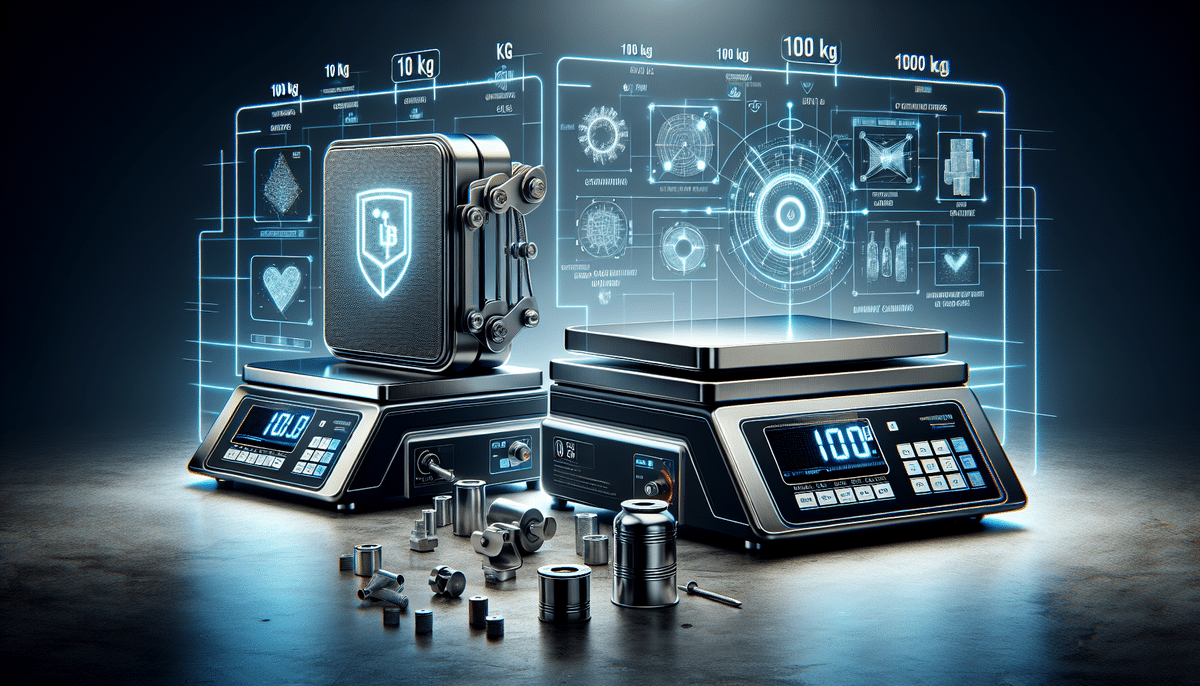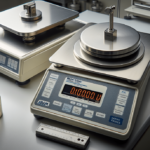Introduction to Accurate Weighing Scales
Accurate weighing scales are indispensable across various industries, ensuring precision in measurements essential for quality, safety, and efficiency. From pharmaceuticals to food processing, the reliability of weighing scales directly impacts product integrity and operational effectiveness. This article delves into a comparison between two renowned scales: the Adam Equipment CPWplus and PEC Scales. We will explore their features, accuracy, portability, durability, ease of use, pricing, and suitability for different applications.
Overview of Weighing Scales
Adam Equipment CPWplus
The Adam Equipment CPWplus is a versatile weighing scale tailored for general industrial, veterinary, and agricultural applications. It comes in various sizes with capacities ranging from 6 to 300 kilograms and readability from 0.2 to 20 grams. Key features include:
- Backlit LCD display with 25mm digits for enhanced readability
- Multiple weighing units: grams, kilograms, pounds, and ounces
- Parts counting function
- Weight accumulation feature
- Auto-power off to conserve battery life
- Stainless steel weighing pan for easy cleaning and maintenance
- Durable ABS housing with non-slip adjustable feet for stability
- RS-232 interface for data transfer to printers or computers
Its robust construction and diverse functionalities make the Adam Equipment CPWplus suitable for a wide range of weighing tasks across different sectors.
PEC Scales
PEC Scales, based in Canada, specialize in designing and manufacturing commercial and industrial weighing scales. Renowned for their durability, high accuracy, and user-friendly interfaces, PEC Scales offer various models including platform, bench, crane, and floor scales. Their capacities range from 25 to 5000 kilograms with readability from 0.2 to 20 grams. Notable features include:
- Easy-to-read LED display
- Intuitive controls such as tare, zero, and hold functions
- Automatic calibration and dynamic weighing technologies
- Remote control operation for inaccessible areas
- Large displays supporting multiple units of measurement
With over three decades in the industry, PEC Scales have established a reputation for producing reliable and high-quality scales. They also provide customization, maintenance, and calibration services to ensure their scales perform optimally.
Feature Comparison
Accuracy and Precision
Precision is paramount in weighing scales:
- Adam Equipment CPWplus: Features a built-in overload protection system to prevent exceeding maximum capacity, ensuring longevity and consistent performance.
- PEC Scales: Offers high accuracy up to 0.05% of the total weight, making them ideal for applications requiring meticulous precision.
While both scales deliver reliable measurements, PEC Scales excel in environments where minute accuracy is critical, whereas the CPWplus emphasizes durability and protection against overloading.
Portability
Portability factors include size, weight, design, and power source:
- Adam Equipment CPWplus:
- Compact and lightweight with handles for easy transport
- Powered by batteries or an AC adapter, offering flexibility
- Backlit display enhances visibility in low-light conditions
- PEC Scales:
- Designed for convenient movement and storage
- Typically powered by an AC adapter, which may limit portability without accessible outlets
- Tare function simplifies measurement of container contents
The Adam Equipment CPWplus offers superior flexibility for on-the-go applications due to its dual power options, making it more adaptable in varied settings compared to PEC Scales.
Durability
Durability is essential for industrial and heavy-duty use:
- Adam Equipment CPWplus: Constructed with a robust steel platform and durable housing, suitable for harsh environments with capacities up to 300kg.
- PEC Scales: Built from heavy-duty materials like aluminum and stainless steel, with a maximum capacity of 150kg, suitable for rugged use but better suited for lighter applications.
For high-capacity and long-term durability, the Adam Equipment CPWplus stands out. In contrast, PEC Scales provide a durable solution for projects requiring lower weight capacities.
Ease of Use
User-friendly interfaces are vital, especially for non-technical operators:
- Adam Equipment CPWplus: Equipped with a straightforward interface and built-in calibration, facilitating easy setup without external tools.
- PEC Scales: Features easy-to-use controls and a large display for clear measurements, though calibration may require external weights and tools.
The Adam Equipment CPWplus offers a more seamless user experience with its integrated calibration feature, enhancing efficiency and simplicity for users.
Pricing
Cost considerations vary based on features and capabilities:
- Adam Equipment CPWplus: Priced competitively starting at approximately $150, providing essential weighing functions and portability.
- PEC Scales: Generally more expensive, ranging from $200 to $500 depending on the model and capacity, but include advanced features like counting, checkweighing, and percentage weighing.
PEC Scales justify their higher price point with additional functionalities suitable for industrial and commercial applications. Conversely, the Adam Equipment CPWplus is ideal for smaller businesses or personal use where budget and portability are key considerations.
Choosing the Right Weighing Scale
Factors to Consider
Selecting an appropriate weighing scale involves assessing several factors:
- Maximum Capacity and Readability: Ensure the scale accommodates the weights you need to measure and offers the required precision.
- Accuracy and Precision: Critical for industries where exact measurements are essential.
- Platform Size and Material: Should be suitable for the items being weighed and durable enough for the operational environment.
- Power Source: Determines portability and placement flexibility, whether battery-operated or requiring an AC adapter.
- Ease of Use and Portability: Important for user efficiency and the ability to relocate the scale as needed.
Applications in Various Industries
Weighing scales have diverse applications across multiple sectors:
- Healthcare: Monitoring patient weight for health assessments and treatment plans.
- Food Processing: Weighing ingredients and ensuring quality control standards.
- Transportation and Logistics: Optimizing load distribution and managing inventory.
- Manufacturing: Ensuring precise measurements in production processes.
- Retail: Pricing products based on weight, particularly in bulk sales.
Industries such as pharmaceuticals, agriculture, and retail heavily rely on accurate and reliable weighing scales to maintain operational integrity and compliance with industry standards.
Maintenance and Future Trends
Maintenance Tips
Regular maintenance ensures the longevity and accuracy of your weighing scale:
- Regular Calibration: Periodically calibrate the scale following the manufacturer's guidelines to maintain accuracy.
- Proper Cleaning and Handling: Keep the scale clean and handle it gently to prevent damage to sensitive components.
- Avoid Overloading: Do not exceed the maximum capacity to protect the load cell and internal parts.
- Environmental Care: Keep the scale away from extreme temperatures, humidity, and corrosive substances to prevent malfunctions.
Future Developments in the Weighing Scale Industry
The weighing scale industry is advancing with technological innovations aimed at enhancing precision, connectivity, and user experience. Future developments may include:
- Advanced Weighing Sensors: Improved sensors offering higher accuracy and faster response times.
- Wireless Connectivity and IoT Integration: Scales that connect to the Internet for real-time data monitoring, analysis, and remote management.
- Sustainable Materials: Incorporating environmentally friendly materials in scale construction to reduce ecological impact.
- Enhanced User Interfaces: More intuitive and interactive displays for easier operation and data interpretation.
- Integration with Automated Systems: Seamless integration with manufacturing and logistics automation systems for streamlined operations.
These advancements are expected to lead to more efficient, accurate, and user-friendly weighing scales, broadening their applications and improving operational workflows across various industries.
Conclusion: Selecting the Optimal Weighing Scale
Deciding between the Adam Equipment CPWplus and PEC Scales hinges on your specific requirements and application contexts. The Adam Equipment CPWplus stands out for general industrial, veterinary, and agricultural uses, offering affordability, durability, and a comprehensive feature set. In contrast, PEC Scales are better suited for heavy-duty applications that demand high precision and accuracy, supported by their robust construction and advanced functionalities.
By evaluating factors such as capacity, precision, portability, durability, ease of use, and pricing, you can select the weighing scale that best aligns with your operational needs and ensures optimal performance.






















